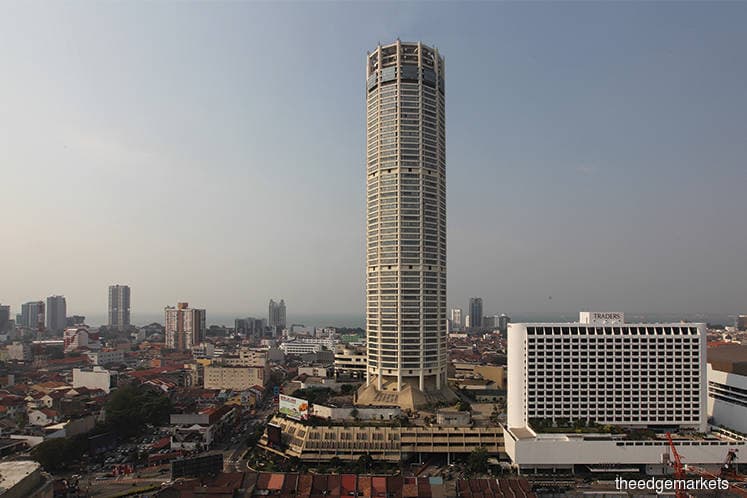
This article first appeared in The Edge Malaysia Weekly on October 2, 2017 - October 8, 2017
PENANG’s services sector has been growing steadily. It contributed 49.1% or RM34.3 billion to the state’s gross domestic product in 2015 — translating into a compound annual growth rate of 6.05% from RM25.6 billion in 2010.
The sector’s growth has been mostly supported by a strong tourism industry. Domestic and foreign tourist arrivals at Penang International Airport (PIA) rose 6.2% to 3.3 million last year from 3.1 million in 2015. Back in 2006, there were 1.5 million tourist arrivals at PIA.
Meanwhile, 1.2 million cruise tourists visited the state last year.
The number of medical tourists, or patients who come from abroad, rose 14.8% year on year to 347,000 in 2016. In the same year, the medical tourism sector saw a revenue growth of 18% y-o-y to RM458 million.
Apart from the tourism industry, the global business services (GBS) segment has emerged as a significant revenue contributor to the services sector. The segment saw a record investment of RM4.1 billion for Penang last year, according to the Malaysian Investment Development Authority (Mida).
GBS hubs are one-stop centres for services such as financial transactions, data analytics, information technology support and human resources for companies that outsource these tasks.
Outsourcing Malaysia (OM) projects that the country’s GBS sector will see a CAGR of 10% to 15% in the next three years.
The Malaysian Digital Economy Corp (MDEC) said GBS companies with Multimedia Super Corridor (MSC) status posted total revenue of RM18.4 billion last year.
Earlier this year, Mida listed Penang as the state with the second largest investment for GBS or principal hub, after Kuala Lumpur.
Penang has more than 50 GBS, shared services and outsourcing, and business processing outsourcing (BPO) centres, which offer about 10,000 high-value jobs.
In May, the state announced the setting up of a RM200 million “GBS by the Sea” complex in Bayan Lepas that would cater for technology, and research and development companies.
State investment arm Penang Development Corp (PDC), which is developing the centre that will be housed in two buildings, said it would be an MSC-status cyber-centre-standard complex that incorporates retail and food outlets.
This is a different project from the RM11.3 billion Business Processing Outsourcing Prime (BPO Prime) and Penang International Technology Park (PITP), to be developed by PDC and Singapore’s Temasek Holdings Private Ltd.
BPO Prime and PITP have been postponed while Singapore-based Economic Development Innovations Singapore Pte Ltd, the project management service provider, will review the property market conditions in Malaysia before deciding on the next step.
BPO Prime was slated to be a part of the state government’s efforts to fulfil its vision of becoming one of the 31 global BPO hubs of the future.
Invest-in-Penang Bhd (investPenang) general manager Datuk Loo Lee Lian says the state is one of the top 10 GBS site choices in the world, particularly in Asia, because of the industry ecosystem, multi-lingual trait and business-friendly environment available.
“The traditional GBS and shared services and outsourcing (SSO) hubs are India and the Philippines, which have been developing their business for many years now.
“But Malaysia has been promoting GBS. In the last three to five years, we have grown to be popular in that area. We don’t have telemarketing or call centres as the call centres are massive and we cannot compete in that space where you have to be cheap to compete,” she says. She adds that several companies in Penang that are in manufacturing have expanded and diversified into GBS — a sign of continued confidence in the sector.
According to Loo, investPenang targets mid-sized level services with a workforce of between 500 and 2,000, and not units with a high headcount such as 10,000 workers, because the state cannot support that kind of size.
She says the GBS sector started when manufacturing multinationals such as Advanced Micro Devices Inc, Osram Licht AG and Jabil Inc moved their centres to Penang a few years ago.
Today, the state houses the business centres of local and foreign companies including AirAsia Bhd, Mesiniaga Bhd, Citigroup Ltd, Luxoft Holding Inc, Toll Holdings Ltd, Wilmar International Ltd, Teleperformance SE and Swarowski AG.
Luxoft has said it will invest RM235 million in human capital and technology for the first five years, and expects to create 500 jobs in IT and software development.
“Penang has a unique niche in GBS. Apart from ease of doing business, we have the support of the local government, an international city with balanced living, a vibrant industry and business community.
“We will benefit from the talent pool that is created because it has a different skillset. Our closest competitor is Singapore but the city state is expensive [for some investors],” says Loo.
Save by subscribing to us for your print and/or digital copy.
P/S: The Edge is also available on Apple's AppStore and Androids' Google Play.